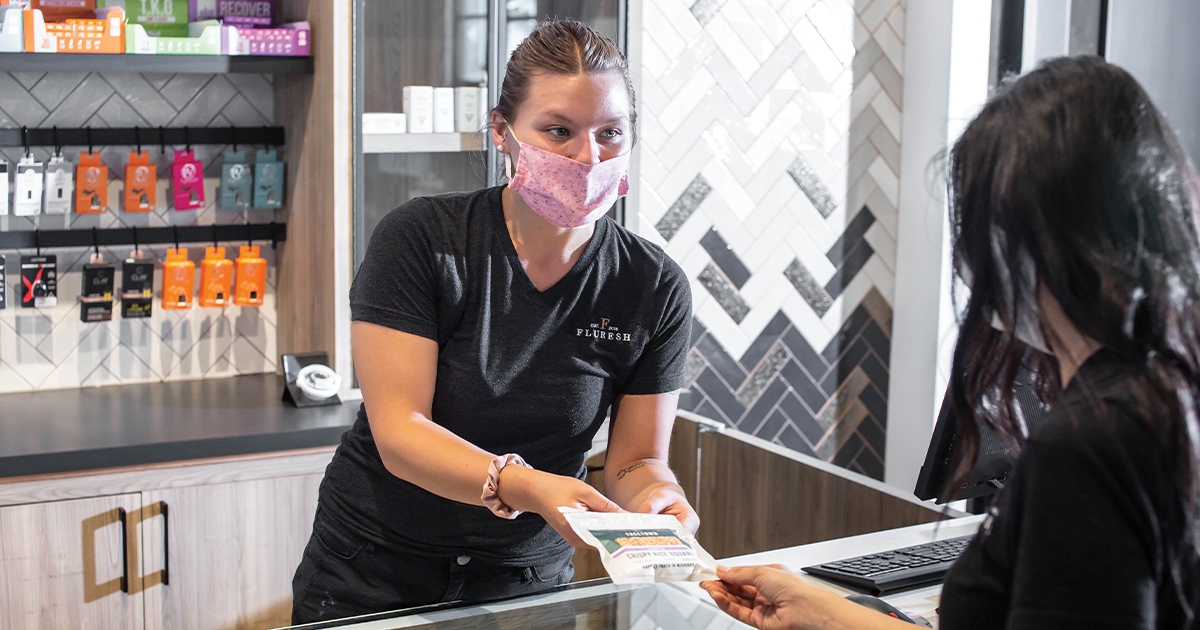For decades, cannabis was demonized. Reefer Madness, The Devil’s Lettuce — it’s a lot of fuss over a nonaddictive plant that can calm you down and ease pain.
And while all that nonscientific fearmongering is obviously malarkey — and was initially driven by racism — it’s understandable that you might have some residual anxiety over getting into the stuff. The good news: We’re happy to help you out, as is just about anyone who’s ever smoked weed.
As legalization slowly spreads across the nation, more people are finding relief for their chronic medical issues. From young cancer patients, to fathers with back pain, to grandmas with joint problems, new patients are discovering the joy of cannabis.
Of course, it’s not a magic potion. The key is to find the product that works for you. For professional advice, we turned to Nic Hernandez, general manager of Fluresh Provisioning Center in Grand Rapids. For now, the store is only for medical patients, but adult-use product is on its way.
To start, you should talk to a doctor. In fact, if you want to get a Medical Marijuana Card, that has to be your starting point. And while adult-use is coming around, there are still benefits to getting a med card.
First and foremost, it means getting professional medical advice on how you should be using the cannabis. Also, at provisioning centers, product is separated into medical and recreational. There are some items, especially ones with higher THC, that you can only get as a medical user. That doesn’t mean if you want to get really high, you should get a med card — it means those products are formulated for people who need it. As a bonus, medical patients don’t pay the 10% excise tax that recreational users do.
Next up, your best bet for learning the ropes is to head to the experts. Patient advisors like that the folks at Fluresh spend all day helping people find the perfect product for them. That’s equally true whether you’re a medical or adult-use patient.
“We really like to take a focus on each individual and what their needs are. There are a few questions that come along with that,” Hernandez said. “Ultimately, I’m going to ask you what brings you in. What led you to this and what are you trying to achieve? Are you trying to sleep better? Are you trying to calm down inflammation or pain? With those basic questions, that’s going to give me an idea of where to put you.”
Certain products include CBD alongside the THC to help with anxiety. Some strains of cannabis might give you a boost of creative energy, while others might mellow you out for the night. And the amount of THC can vary massively.
There’s also a huge variety of ways to ingest cannabis. Edibles, drinks, extracts, topicals, cartridges, joints — you don’t ever have to touch a bong if you don’t want to. It’s all about what you’re comfortable with.
“The real motto is start low and slow,” Hernandez said. “For instance, we have soft gel capsules that come in smaller doses as well as a new-to-the-market, unique fast-acting drink enhancer. You can squeeze it and mix however much you want in any beverage you choose, so there’s a lot of control over the dosage.”
Aside from the provisioning center, Fluresh also sells high-quality cannabis products across the state for both medical and adult use. They believe cannabis can improve well-being for each person’s dynamic life. To that end, Hernandez believes everyone should take time to read up and find out what works best for their unique needs, and have fun doing so.
“The big focus is, be patient. It’s really good to do a lot of research. Fluresh has a kind of ‘cannabis journal,’ so anybody who’s starting out can really document the products they’re using and whether they’re working or not.
“Really, it’s a very unique experience as everybody’s endocannabinoid system is unique to themselves. And just because something works for me, it may not work for you. It’s really about being patient and being able to adapt and find products and information that continues to guide you on your journey.”
Cannabis Glossary
Adult-use: A term for nonmedical users that seeks to remove the stigma of using cannabis “just” for recreation.
Cannabis: The entire plant, also known as marijuana, among other names.
CBD: Cannabidiol, a component in cannabis that may ease anxiety and pain, with no high.
Hash: A cannabis concentrate not commonly seen here, but perfect for some clever wordplay.
Provisioning center: Sells cannabis products. Colloquially referred to as a dispensary.
THC: Tetrahydrocannabinol, the main thing in cannabis that gets people high.





